Please read the label carefully before feeding your pet, we are responsible pet parent we should feed our dogs healthy and nutritious food. It is, of course, important to realize that poor nutrition can have an impact on their health and their temper. If these deficits are noted early enough they can preferably be corrected before they turn into chronic issues. This is how you can tell that your dog may be suffering from one or more nutritional deficiencies.
1. Coat & Skin Condition Changes
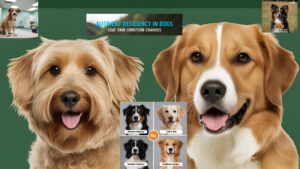
The coat of a dog can be so hopefully, when this is compromised it is indeed a major sign that a dog is suffering. Even the lack of a soft, shiny, and smooth looking thick layer on your dog might indicate a nutritional problem. The skin and hair also require some vitamins, such as the Omega 3 and Omega 6 fatty acid chain that is necessary for the body, and if these are missing, you might wake up one morning absolutely bald. Of course you may observe shedding, scaly skin or bald patches; particularly if your dog is low on vitamin A or E.
2. Nutritional Deficiencies in Dogs: Weight Loss or Poor Appetite

Lack of appetite or a nonobese, thin dog that is eating as it should or a dog that has recently developed a poor appetite may be an indication of nutritional problems. Lack of sufficient quantity of vitamin B12 or iron can cause these symptoms. This also causes a person to lose weight because the body’s muscles will start breaking down due to the deficiency of protein. Make sure to keep an eye on their feeding habits especially if the problem rises to the surface then seek the veterinary’s opinion.
3. Nutritional Deficiencies in Dogs: Lethargy and Weakness
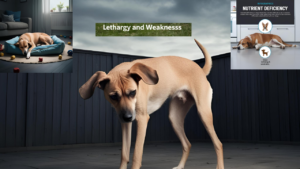
Nutritional Deficiencies in Dogs, Dogs with deficiencies in their diet may be diagnosed to be suffering from B vitamin deficiencies or iron deficiencies in general look pale and weak. If your dog has less energy than usual, look uninterested in exercise or play, or appears to be overtired, it may be as a result of of a nutritional deficiency. Inability to hold up ones limbs or difficulties getting up may show signs of calcium or phospherous or any of the minerals that are vital for bone strength in the body.
4. Digestive Issues
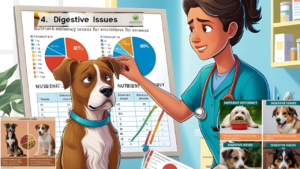
Persistent vomiting, diarrhea or constipation, usually indicates that the dog is composed of an improper diet. For example, lack of fiber or certain vitamins results in some form of digestive discomfort. If the problem of some digestive disorder is continuing you must think about the diet of your pet and make some changes.
5. Behavioral Changes
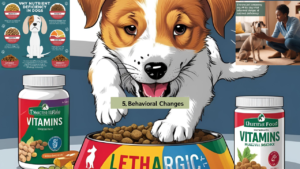
Dogs’ moods and even their behavior may change because of nutrition as well. Irritability or anxiety can result from inadequate nutrition and deficiencies in such nutrients as essential fatty acids and amino acids. This is commonly seen in more playful/demi socially active dogs, and such dogs might even become isolated and aggressive whenever they are affected by imbalances in the diet.
6. Poor Bone and Joint Health
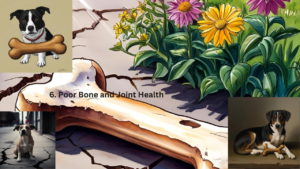
Lack of adequate calcium and phosphorus may result in characterizing your dog’s bones to be frail and lastly your dog becomes prone to fracture or joint problems. Some of the symptoms involve problems in standing up, lameness or stiffness that’s common in old age. In growing puppies,gestational and other nutrient deficiencies can cause developmental bone disease.
7. Poor Oral Health
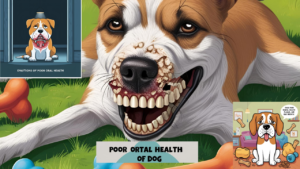
The health of your dogs teeth or gums will show whether or not they have a deficiency in certain nutrients. Deficiency in calcium or phosphate or vitamins such as vitamin A and C are some of the causes of gum diseases and tooth decay, and bad breath. Your dog is struggling with the ability to chew properly or its gums are swollen red and bleeding, it is time for a diet change.
8. Irregular Urination
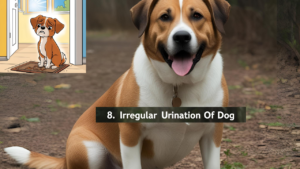
Another sign could be orders or appearance of the urine because they could be a sign of nutritional problems. Any deficiency in potassium or magnesium leads to problem such as that of urinating often or experiencing problems with the kidney. This is particularly true if your dog is drinking more water than it usually does or if it has issues with urinating normally to discuss issues such as nutrient deficiencies with the veterinarian.
9. Dep Grafik 2 The Behavioral Signs of Malnutrition
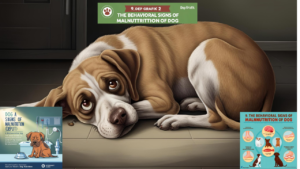
Aging dogs on a poor diet, for instance, may have visible symptoms of poor nutrition. These may include: wood chewing, feces eating (coprophagy) or excess surface licking. Such behaviors normally give a signal that the dog is deficient in some important nutrient and he’s trying in his own best way to make up for this lost nutrient.
10. Seeking Professional Advice

If you find any of these symptoms around your pet, you should seek your veterinarian’s advice right away. A professional will be able to pinpoint the exact areas of absence through blood tests or even discussing her diet plan. They can then advise you on the right changes to your dog’s diet or supplement that may help deal with the problem.
This paper focuses on the need to understand and identify nutritional deficiencies in dogs so that such animals can be healthy. Observation of your dog’s coat, appetite, behavior and physical condition on a regular basis can assist in identify nutrient deficiencies. Water your dog with well-balanced food at all times and consult a vet when you realize there might be a deficiency in your pet. Provided your pet is given the necessary care it deserves, it should be able to live a healthy life span as any other dog.
How can I tell if my dog has a nutrient deficiency?
Look for symptoms like dry skin, hair loss, muscle weakness, lethargy, brittle bones, or poor appetite.
What causes nutrient deficiencies in dogs?
Poor diet, low-quality pet food, underlying health conditions, or malabsorption issues can lead to deficiencies.
Can homemade dog food cause nutrient deficiencies?
Yes, if not properly balanced. Dogs need a mix of proteins, vitamins, and minerals to stay healthy.
What vitamins are essential for a dog’s health?
Essential vitamins include A, B-complex, C, D, E, and K, along with minerals like calcium, iron, and zinc.
Can nutrient deficiencies lead to serious health problems?
Yes, prolonged deficiencies can cause bone deformities, neurological issues, immune system weakness, and organ failure.
What foods help prevent nutrient deficiencies in dogs?
High-quality commercial dog food, lean meats, fish, eggs, leafy greens, and supplements (if recommended by a vet).
Should I give my dog vitamin supplements?
Only if advised by a veterinarian. Over-supplementation can be harmful.
When should I see a vet about my dog's nutrition?
If your dog shows signs of nutrient deficiency, sudden weight loss, or persistent health issues, consult a vet immediately.
